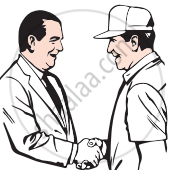Advertisements
Advertisements
प्रश्न
Why does the poet feel glad that he does not play any game?
उत्तर
The poet feels glad that he was not a player but only a spectator. He is glad because the risk of injuring himself and others is more if he becomes a player.
APPEARS IN
संबंधित प्रश्न
Guess what friendly words these two gentlemen exchange when shaking hands.

Mention the qualities the child in the poem symbolises.
Interpret each of the following expression used in the poem, in one or two line.
shake hands without hearts
Interpret each of the following expression used in the poem, in one or two line.
hands search my empty pockets
Read the given lines and answer the questions that follow in a sentence or two.
Well, ego it might be pleased enough But zealous athletes play so rough…
- What pleases the ego?
- Why are athletes often rough during play?
Explain the following with reference to the context in about 50–60 word each.
Athletes, I’ll drink to you, Or eat with you, Or anything except compete with you…
Underline the alliterated word in the following line.
For this most modest physiques…
Underline the alliterated word in the following line.
They do not ever in their dealings…
Find out the rhyme scheme of the given stanza.
One infant grows up and becomes a jockey
Another plays basketball or hockey
This one the prize ring hates to enter
That one becomes a tackle or center…
If you go to a village, what scenes would you observe?
Read the lines given below and answer the question that follow.
If this belief from heaven be sent,
If such be Nature’s holy plan.
- What does ‘heaven’ refer to?
- Why does the poet call it ‘holy’?
Read the following line and identify the figure of speech used in each extract.
What Man has made of Man?
What makes the fakir stare in wonder?
Describe Macavity’s appearance.
Read the given lines and answer the question that follow.
‘It must have been Macavity!’ but he’s a mile away.
- What is Macavity blamed for?
- Where is he?
Explain the following line with reference to the context.
And his footprints are not found in any file of Scotland Yard’s
Explain the following line with reference to the context.
He always has an alibi, and one or two to spare
Which path should we follow in life?
What does ‘Everest’ in the title stand for?
Read the given line and answer the question that follow.
Defeat we repel, courage our fort;
- How do we react to defeat?
- Which is considered as our stronghold?
Work with a partner and take this short quiz to find out how well-informed you are about history.
- Name a few wars and battles you have read about.
- What is the difference between a war and a battle?
- Why do rulers wage wars and battles?
- Is the outcome of a war always fair?
- Do you think rulers understand the true meaning of life – in defeat or in victory?
- Can you name a few kings and leaders who have fallen from glory to disgrace?
Are all deposed kings slain by the deposer?
What does ‘flesh’ mean here?
What are the various functions and objects given up by a defeated king?
Bring out King Richard’s feelings when he was defeated.
Pick out the alliteration from the following lines:
“Our lands, our lives, and all, are Bolingbroke’s,…”
Based on your reading of King Richard’s speech, answer the following questions in about 100 - 150 words each. You may add your own ideas if required to present and justify your point of view.
How are eternal truths and wisdom brought to the reader here?
